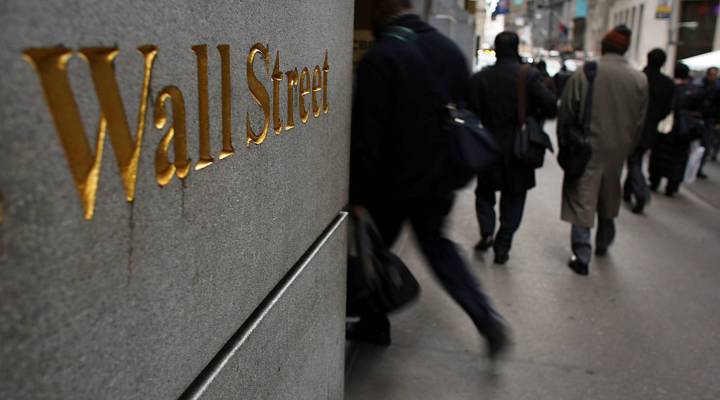
Wall Street isn’t just in New York anymore

Wall Street is an actual place, a historic part of lower Manhattan, but these days the phrase is more often used as a label to mean big banks, stock exchanges and all things finance. And in 2016, calling all that stuff “Wall Street” could be a bit of a misnomer. What we mean when we say Wall Street now includes investment firms in midtown Manhattan and Connecticut, and banks headquartered across the river in New Jersey or out in the New York suburbs.
Wall Street is also headed south, to states like Texas and Florida that have worked to reshape their cities into finance hubs.
The first thing I noticed on a recent early-morning visit to Wall Street is that it’s pretty: the streets are made of worn brick, and buildings and columns are stone and marble. But overall, it’s kind of hushed.
Jamal Abouelqhair, who’s been selling coffee from a cart on Wall Street for a long time, says each year, it’s been quieter for him. “Much much quieter. Double much quieter.”
And growth has slowed for the financial industry: Goldman Sachs, Morgan Stanley and Citigroup have all announced layoffs in the past year.
“The costs of living in a place like New York continue to go up,” said Kathryn Wylde, President and CEO of the Partnership for New York City, an association of New York CEOs. The group put out a report last year called “At Risk: New York’s Future As The World Financial Capital.” The group surveyed Wall Street businesses it works with and found most of them have either moved jobs out of New York recently, or say they’d consider relocating outside New York, citing cost as their major concern. Wylde says technology makes it easier to shift a variety of positions away from New York locations.
The shift has shown up for other cities, too: “Wall Street” offices have been opening from Jersey to Texas. According to Bureau of Labor Statistics data,, finance jobs in New York City proper are down 10 percent from a 20-year high in 2000.
The South and Southwest have become hotspots: Tampa metro has seen a 7 percent increase over that same time, Dallas-Fort Worth a 38 percent increase in the broad BLS category of Finance and Insurance. Kathy Wylde says these places are more actively competing against New York now.
“The states that are winning these financial services jobs are basically sending a message, we appreciate you, we want you, we’ll support you,” she said. Outside of New York, firms can pay people less for the same work, taxes are often lower, and rents are cheaper; places like Dallas advertise these facts in aggressive campaigns to bring relocations to their area. Plus, if a corporation wants to just build its own offices or campus, the option to build out into the suburbs is still there in lower-density places.
“Those boundaries are constantly being tested, and constantly being moved,” said Jay Biggins, a corporate relocation consultant. He says there’s not necessarily a limit to how much Wall Street could decentralize as the economy becomes both more global and more tech-driven.
The first big wave of relocations was after September 11, 2001, when firms decided to create fully redundant centers where they could run their operations in case of emergency. The next wave was moving back-office jobs, and now, even more is up for grabs: advisors, traders, and fund managers may all be based outside of New York’s financial district.
“We can run our company seamlessly from Tampa, and in fact we needed to do that after Superstorm Sandy,” said Marie Chinnici-Everitt, chief marketing officer for DTCC, which processes financial transactions for major banks. DTCC opened up a Tampa office in the 2000s.
She says now the company has 20 percent of its workforce here, more than in New York. She moved to Tampa from New York a few years ago, and she’s a booster.
“The sun is shining, you have beautiful waterfront views,” she said. Plus, it’s on eastern time, there’s an international airport, and the commute’s not bad. “I used to sit in traffic for an hour and 45 minutes in New York and I’m door-to-door in 30 minutes here.”
I met another guy who’s watched Wall Street through some ups and downs: Dusty Rhodes, a locally popular saxophone player who takes advantage of the eerie echoes created by the columns outside the Deutsche Bank building.
He says he has seen some change, especially since 9/11, but to him it mostly still feels like business as usual.
“I haven’t necessarily seen a shift yet, like all of a sudden Wall Street’s not Wall Street, you know what I mean?”
He says it’s a financial center, a former African burial ground, and a neighborhood where people live, walk their dogs and bring their kids to preschool. He used to live on Wall Street himself–now high prices have pushed him out to Brooklyn. But he says it’s still his favorite place to play.
There’s a lot happening in the world. Through it all, Marketplace is here for you.
You rely on Marketplace to break down the world’s events and tell you how it affects you in a fact-based, approachable way. We rely on your financial support to keep making that possible.
Your donation today powers the independent journalism that you rely on. For just $5/month, you can help sustain Marketplace so we can keep reporting on the things that matter to you.












